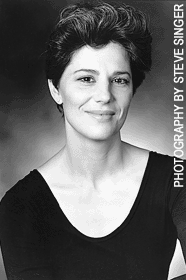Alumni
newsmaker:
>
> Melinda
Wagner, AM'82, wins 1999 Pulitzer Prize in music
 Music
surrounded Melinda
Wagner, AM'82, as she was growing up. The daughter
of a music-teacher mother, she started composing on the piano
herself when she was 5, though she didn't write anything down.
That changed when she was 16 and the Pennsylvania Academy of Music
chose her chamber piece for piano, flute, harp, and oboe as one
in a series of young people's compositions to be performed by
its conservatory students. "Then I had to get busy and write it
down," she recalls. This past April, one of her written-down pieces
led to a career high note, the 1999 Pulitzer Prize in music for
her Concerto for Flute, Strings, and Percussion.
Music
surrounded Melinda
Wagner, AM'82, as she was growing up. The daughter
of a music-teacher mother, she started composing on the piano
herself when she was 5, though she didn't write anything down.
That changed when she was 16 and the Pennsylvania Academy of Music
chose her chamber piece for piano, flute, harp, and oboe as one
in a series of young people's compositions to be performed by
its conservatory students. "Then I had to get busy and write it
down," she recalls. This past April, one of her written-down pieces
led to a career high note, the 1999 Pulitzer Prize in music for
her Concerto for Flute, Strings, and Percussion.
 |
| Pulitzer
winner Wagner |
"Having
the vote of confidence from the judges and my colleagues makes
me feel I should keep going," says Wagner, who studied music as
an undergraduate at Hamilton College and then composition as a
graduate student at the U of C, where her mentor was Shulamit
Ran. She earned her Ph.D. at the University of Pennsylvania, where
she studied under Richard Wernick.
Receiving
the prize was also uplifting--at the awards luncheon in Columbia
University's library, she shared a table with Duke Ellington's
family, there to accept a special posthumous award marking the
centennial of the quintessential American composer's birth.
"I
think of my music as being very American," she says. "And as much
as I still adore the music of late 19th-century Europe, my music
has recently departed from that a bit." Moving to musical terms,
Wagner describes her work as lyrical, rhythmic, and chromatic.
She doesn't use key signatures, yet is conscious of establishing
strong tonal centers. In some ways, she says, her Pulitzer-winning
piece--commissioned by the Westchester Philharmonic, and first
performed May 30, 1999--is atypical: "My other music is more difficult
to listen to," she says. "Some people respond to it favorably,
and then there are probably many others who don't like it."
Since
her first piece for the Pennsylvania Academy of Music, she's composed
some 60 works, including pieces for chamber groups, orchestras,
and string quartets.
Working
in an attic room at her Ridgewood, NJ, home, she begins each piece
by making decisions about its basics--whether the piece will be
fast or slow, soft or loud. Wagner then focuses on a melody, tunes
she's thought of while going about her day. "I noodle around on
the piano or I hum a tune as I'm walking to the store."
For
example, she began composing the flute concerto with a fast lick
on the flute: an obvious choice, she felt, because the flute sounds
"wonderful" when going fast. Once the melody is in place, she
works the piece through "pitch by pitch." "I try to allow the
piece to reveal itself as I'm going along, although sometimes
I compose the end first," she says.
The
Pulitzer is only one of her honors. Wagner also has been awarded
three ASCAP Young Composer Awards, a Guggenheim fellowship (1988),
and a 1996 Howard Foundation fellowship, which allowed her to
take a sabbatical from her teaching job at Hunter College.
Among
her current projects are a piece for the American Brass Quintet
and an overture for the New York Pops that will feature her husband,
percussionist James Saporito. The couple has two children, Benjamin
and Olivia.
She
doesn't have a single favorite piece among her compositions, but
says that she likes parts from them all--based on which parts
she thinks work best. "I always feel that my next work is potentially
the best one. I try to keep a carrot at the end of the stick."
--Q.J.



![]()
 Music
surrounded Melinda
Wagner, AM'82, as she was growing up. The daughter
of a music-teacher mother, she started composing on the piano
herself when she was 5, though she didn't write anything down.
That changed when she was 16 and the Pennsylvania Academy of Music
chose her chamber piece for piano, flute, harp, and oboe as one
in a series of young people's compositions to be performed by
its conservatory students. "Then I had to get busy and write it
down," she recalls. This past April, one of her written-down pieces
led to a career high note, the 1999 Pulitzer Prize in music for
her Concerto for Flute, Strings, and Percussion.
Music
surrounded Melinda
Wagner, AM'82, as she was growing up. The daughter
of a music-teacher mother, she started composing on the piano
herself when she was 5, though she didn't write anything down.
That changed when she was 16 and the Pennsylvania Academy of Music
chose her chamber piece for piano, flute, harp, and oboe as one
in a series of young people's compositions to be performed by
its conservatory students. "Then I had to get busy and write it
down," she recalls. This past April, one of her written-down pieces
led to a career high note, the 1999 Pulitzer Prize in music for
her Concerto for Flute, Strings, and Percussion.